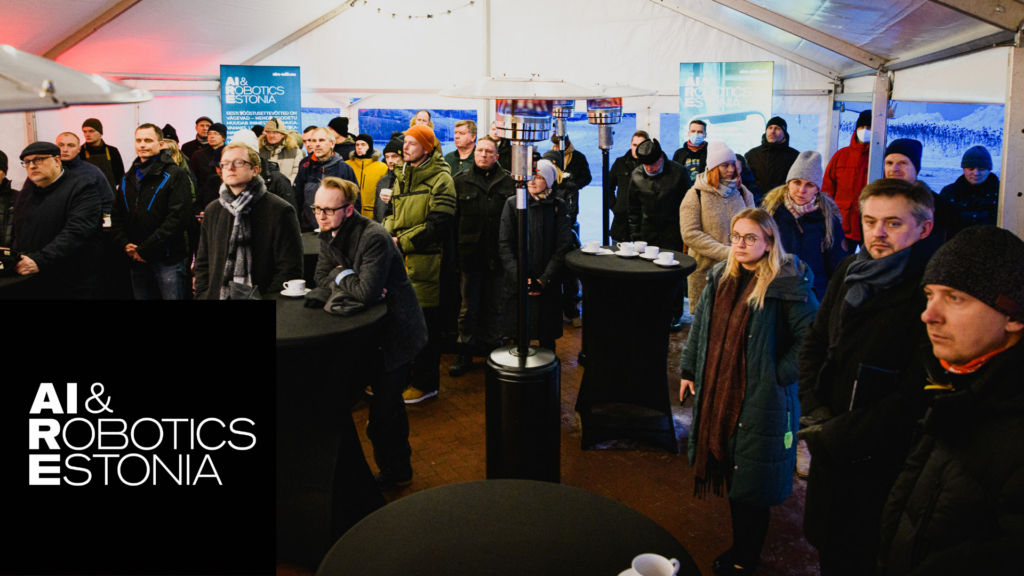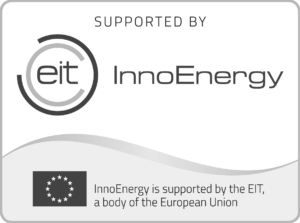21.12.2021
AIRE Club #2 shone a light on funding

On a crispy cold Friday afternoon, the second meeting of the AIRE Club was held outdoors at the Tehnopol Science and Business Park, defying the weather with heating lamps and glasses of mulled wine, offering fascinating presentations and the chance for members of the club to meet one another.
AIRE, or AI & Robotics Estonia, has been set up to make Estonian manufacturing more competitive, and to bring together manufacturing companies, solution providers, universities and science parks, with everyone striving for a single goal.
The AIRE Club is a series of events that create a free and open atmosphere in a space where those interested in robotics and artificial intelligence can communicate and network together. They are open to research and development institutions, manufacturing companies, IT and electronics companies, professional associations, support organisations, and funders.
AIRE will in future become a member of a pan-European network of more than 200 digital innovation hubs in the European Union, and so AIRE Club can be a physical meeting space for presenting not only local services and success stories, but also the work of other European hubs that may be of interest to Estonian manufacturing companies.
An excellent example of cooperation between the public sector, universities and business
Sille Kraam, Deputy Secretary General for Economic Development at the Ministry of Economic Affairs and Communications for Estonia, said in her welcome speech to open the event that AIRE is an excellent example of cooperation between different parties. “I very much hope that AIRE will become a strong centre of skills and development that can help businesses take the next step or raise their technology to the next level”, she said.
“Great work has been done already on this, and I am pleased to see so many people here today. It seems to be understood increasingly widely what data can offer us and how data can be valued so that not only can general efficiency be increased, but better and more effective management decisions can be made. I firmly believe that digitalisation is the advantage and the firm foundation for making business models sustainable”.
Indrek Orav, the Tehnopol CEO, noted how enthusiastic Tehnopol is about the project. “We at Tehnopol are very proud, as this whole area is very important for us. Our goal is to support innovation and technological enterprise to make the world a better place, and we see that this project lets us support those businesses that want to grow and develop. I wish this club every success and may our cooperation run smoothly in future as well!”, he said.
The size of the team does not decide the size of the actions
Sven Illing, Vice-Rector for Entrepreneurship at Tallinn University of Technology, referred to the university’s motto Mente et Manu, meaning by mind and hand. “Coming here it occurred to me that this suits perfectly for AIRE, as we use artificial intelligence and robotics to make businesses more competitive”.
At the first AIRE club meeting in Tartu, Sven spoke about the example of Google, where a team of three people created solutions that change the world. “Now at this event I see the Starship robot and can confirm that this is a real example of how here in Estonia with a relatively small number of people we can manage great things”, he said, adding that “we will continue to do great things here in Estonia, and we must remember that these things happen because we know one another and support one another”.
Support grants
Andri Haran, Head of Industry at the Ministry of Economic Affairs and Communications, spoke about the new digital investment support measures that will be launched in February or March with a total value of 5.8 million euros. The main aim of the measures is to support the introduction of automation and digitalisation solutions in business.
“The feedback from industry has been that there are many soft and vague measures, but there have not for a long time been the sort of large-scale specific opportunities to apply for the funding needed to help bring investments to life, and that is what we are working on”.
The main target group for this funding is companies in manufacturing, mining and logistics, which can apply for support of up to 300,000 euros per project in 2022-2025. Andri mentioned four other support activities:
- the purchase, development and installation in the supply chain of the applicant of the immaterial and material assets, digital technologies and robots needed for automation, including the development and implementation of licences and the cost of patents;
- the organisation of training in the development and application of technology and robots and automation for staff;
- the consultation services needed for the purchase, development and installation of digital technologies and robots, and for automation;
- pay for the people and contractors working on developing and installing technology and robots and on automation.
Kersti Kuusksalu, Digitalisation Topic Manager at Enterprise Estonia, spoke about other possible forms of support. “The values and nature of companies are different, and so their needs differ”, she said. Enterprise Estonia provides solutions and support to companies that are based on their needs.
As well as financial support, there is a recently introduced service named the digitalisation master class. This service covers guidance, advice and information on how to carry out digitalisation. Companies receive personalised guidance and training sessions for three months. A new group will start at the beginning of February, and applications to join it can be submitted until the start of January.
Enterprise Estonia also runs the industrial hack, which is a tailor-made hackathon event over two and a half days, where companies can create their own tailor-made solutions. Registration for the hack is already open, and the hackathon will be held in March.
A programme to support AI-based projects is planned
Martin Goroško, Business Service Manager at Tehnopol, presented the framework programme that is planned jointly with the Ministry of Economic Affairs and Communications. The dynamic programme, which has not yet been announced, will support the work of AIRE and will help build and pilot real AI-based projects. It will identify the challenges that arise from data and manufacturing, and will find those who can offer solutions. It will support the implementation and execution of pilot projects.
The break between presentations allowed participants to grab a bite to eat, refresh their mulled wine glasses, take in the photo-wall, and get to know one another. Before the conversation had run out though, there was one more presenter, Siim Viilup.
Siim Viilup is the Mechanics and Robot Infrastructure Team Lead at Starship Technologies, and his presentation closed the second AIRE Club event. He spoke about the success story of Starship, the larger and smaller challenges faced along the way, and much more besides.
Questions after the presentation seemed to come without end, including “What did the robot originally looked like?”, “What happens if there is no network for the robot?”, and “Was it the robot itself that thanked me when I helped it out of the snow, or was it a real person?”. The answer to the last question was that it was a real person.












